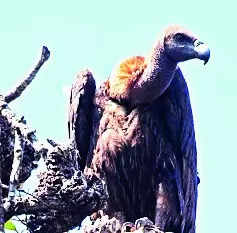Rajasthan
Drugs Technical Advisory Board: Board Wants Ban On 2 Drugs To Avoid Death Of Vultures |
Jaipur: Environmentalists in the state have welcomed Drugs Technical Advisory Board (DTAB)’s recommendation to ban manufacture, sale and distribution of Ketoprofen and Aceclofenac in its 89th meeting last month. The minutes of the meeting became public on Saturday.
These drugs are extensively used for livestock treatment and have been identified as a significant cause of vulture deaths in the country, including Rajasthan, which is home to the highest population of vultures in Jorbeer, Bikaner. State environmental activists had sent a letter to Prime Minister and the state chief wildlife warden, urging them to ban the drugs used to treat livestock. The request came after the discovery of carcasses of three different species of raptors, including Black Kites, Egyptian Vultures and Steppe Eagles, near a dumping site located approximately 12km from Bikaner.
Dau Lal Bohra, a member of the International Union for Conservation of Nature (IUCN), stated that every year, thousands of raptors from more than 17 species migrate to the carcass dumping site, which is the highest number in the country and Asia. These birds are falling victim to the two medicines administered by veterinarians to cattle. The ban on these drugs will support conservation efforts. Bohra said, “The migratory bird species do not belong to any one country, making it essential for India to ensure it does not become their final resting place. The use of these drugs has led to annual mortalities and pushed many species of raptors into the threatened category. The UN’s past programs on conservation and population monitoring has highlighted concerns over the deaths in Jorbeer.”
These drugs are extensively used for livestock treatment and have been identified as a significant cause of vulture deaths in the country, including Rajasthan, which is home to the highest population of vultures in Jorbeer, Bikaner. State environmental activists had sent a letter to Prime Minister and the state chief wildlife warden, urging them to ban the drugs used to treat livestock. The request came after the discovery of carcasses of three different species of raptors, including Black Kites, Egyptian Vultures and Steppe Eagles, near a dumping site located approximately 12km from Bikaner.
Dau Lal Bohra, a member of the International Union for Conservation of Nature (IUCN), stated that every year, thousands of raptors from more than 17 species migrate to the carcass dumping site, which is the highest number in the country and Asia. These birds are falling victim to the two medicines administered by veterinarians to cattle. The ban on these drugs will support conservation efforts. Bohra said, “The migratory bird species do not belong to any one country, making it essential for India to ensure it does not become their final resting place. The use of these drugs has led to annual mortalities and pushed many species of raptors into the threatened category. The UN’s past programs on conservation and population monitoring has highlighted concerns over the deaths in Jorbeer.”





